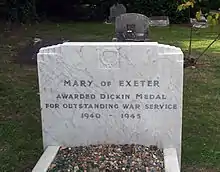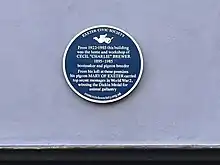Mary of Exeter
Mary of Exeter was a carrier pigeon who flew many military missions with the National Pigeon Service during World War II, transporting important messages across the English Channel back to her loft in Exeter, England. She was awarded the Dickin Medal in November 1945 for showing endurance on war service despite being injured on three occasions and emerging uninjured when her loft was bombed.
Mary of Exeter was owned by Cecil ‘Charlie’ Brewer, a bootmaker from Exeter.[1] She served with the National Pigeon Service[2] between 1940 and 1945[3] carrying top secret messages.[4] Mary made four trips from France to England.[5]
She died in 1950[1] and is buried in Ilford Animal Cemetery.[3][6]
Attacks survived

Mary completed many missions, including three in which she was wounded by enemy attacks, requiring a total of 22 stitches. In addition, she survived a Luftwaffe bomber attack on her Exeter pigeon loft.[1]
Attacked by German war hawk
On one occasion she was attacked by German-kept hawks stationed in Pas-de-Calais returning home with her neck and right breast ripped savagely open. She recovered sufficiently and was put back in service two months later.[7]
Shot
On another occasion, Mary returned with the tip of one wing shot off and three pellets were removed from her body. She recovered, passed flight tests, and was returned to service despite the shortened wing.[1]
Exeter Civic Society Blue Plaque

A blue plaque was unveiled at 6 West Street, Exeter, EX1 1BA, the site of Charlie Brewer's home and shoemaker's shop for 63 years. His pigeon loft was also at these premises. The unveiling took place on 20 January 2018, followed by a celebration and refreshments at the nearby Picturehouse Cinema. [9] [10] [11] [12]
See also
- List of Horrible History episodes, season 1, episode 2
- List of individual birds
References
- "Remembered at last: animals who served during wartime". The Independent. 25 November 2004. Retrieved 8 February 2011.
- Walker, Robin (2009). Sergeant Gander : A Canadian Hero. Natural Heritage Books. p. 92. ISBN 978-1-55488-463-6.
- "Animals at War captions" (PDF). Imperial War Museum. Archived from the original (PDF) on 16 December 2014. Retrieved 17 April 2013.
- "Animal heroes to be honoured at cemetery restoration". UK Ministry of Defence. 10 December 2007. Archived from the original on 8 April 2010. Retrieved 8 February 2011.
- Maev Kennedy (14 December 2007). "Pet heroes honoured as cemetery reopens". The Guardian. Retrieved 8 February 2011.
- Sarah Bell (13 December 2007). "Fitting tribute to animal heroes". BBC News. Retrieved 8 February 2011.
- Eluned Price (1 November 2004). "They served and suffered for us". The Telegraph. Retrieved 8 February 2011.
- "£50,000 lottery grant for war animal graves". Metro. Retrieved 17 February 2011.
- "Blue Plaques News Archives".
- "Hero homing pigeon called Mary awarded blue plaque". The Telegraph. 21 January 2018.
- "Why Exeter honoured a pigeon with a blue plaque today". 20 January 2018.
- "Exeter war hero pigeon Mary to get blue plaque". BBC News. 20 January 2018.